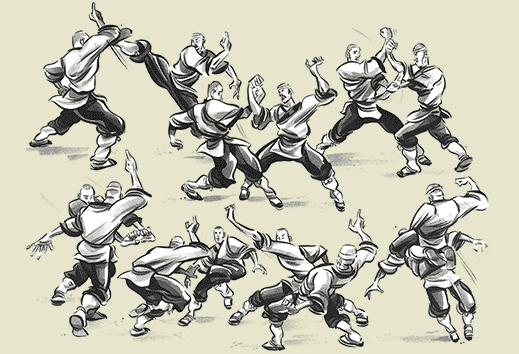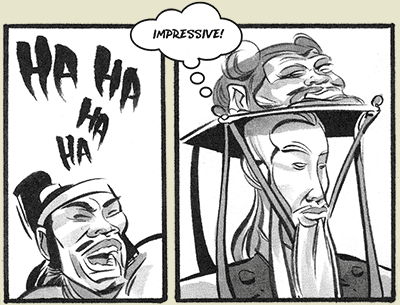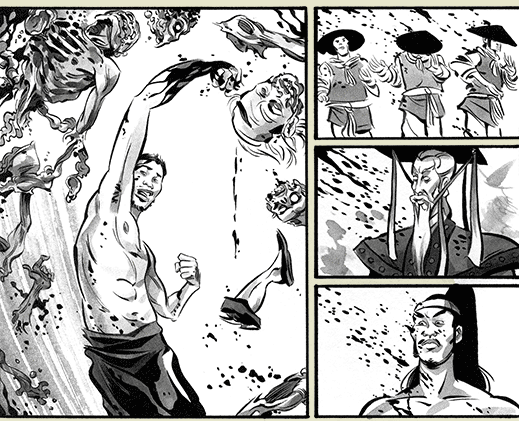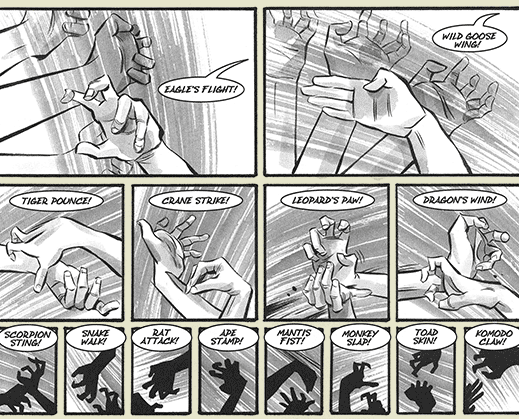Infinite Kung Fu
Being almost entirely driven by my tastes, I find myself in the unenviable position of being unable to appreciate any number of things I might otherwise find to be fantastic—things of merit and quality! So while I can appreciate talent and imagination in all kinds of cultural produce, I cannot enjoy a fair number of those books, movies, and records. It's not easy on me—in a spiritual sense. I would love to take as great a pleasure in these superior incarnations of the creative spirit as I would had they only been crafted closer to my tastes.
All this is to preface why I didn't enjoy Infinite Kung Fu despite it being a marvelous, carefully produced work and house to the exhibition of a major talent.

In the late '70s, I adored weekends because local television syndicates (KTLA 5 and KCOP 13, if I recall) would fill the weekends with Godzilla movies and kung fu theater. It was a glorious time to be a kid. I distinctly remember the delicious terror of The Flying Guillotine and other violent, bizarre martial fantasies. I'm not certain if it was being over-saturated with violent, action-y media in the thirty-plus years hence that did it, or if I just turned smug and elitist, but none of that appeals to me anymore. I watched Jason Statham's Transporter a few years back and despite lots of testosterone and choreography and kinetic dynamism and explosions, I was only interested in the character interactions. I felt let down by myself. Was this the kind of person I had grown into? I avoid rewatching Die Hard or Aliens or The Last of the Mohicans for fear that my former go-to action paeans will have lost their luster.

And if I had once-though-no-longer enjoyed martial arts films, I have never acquired a taste for explorations of the undead. I've actually never seen more than a few minutes of Night of the Living Dead and while I do bear affection for the Evil Dead series, that's more just a salute to my enjoyment of Bruce Campbell and Sam Raimi than anything.1 I liked 28 Days Later and the original Invasion of the Body Snatchers okay, but in each case for reasons unattached to the horror elements involved. I haven't been interested in watching the AMC adaptation of The Walking Dead—a comics series of which I own three volumes and have only read most of two.
So when you discover that Infinite Kung Fu is a hybrid of martial arts adventure and zombie stories, you might wonder that I could have been induced to pick it up at all. I wonder myself that I ever gave the book a shot. Still, it's well-regarded and there was quite a bit of excitement over its publication. And with good reason: it's a fantastic, amazing book—that I don't like.

Creator Kagan McLeod has an evident love for the genres in which he's working. Infinite Kung Fu's world is overrun by undeath and only the masters of good kung fu can defeat those of poison kung fu and return life and balance to the land. Every page is crafted with care and affection. McLeod employs a visual style reminiscent of Chinese brushwork, with the ink tapering off into stranded, nomadic lines of inky gravel. His figures are elegant and abrupt, delicate and angry—so much the better for depicting a beautiful young monk bursting open to reveal hundreds of centipedes. The story elements are deliciously reminiscent of the most gratuitous moments of the martial arts films I grew up on. And in case someone was skeptical, McLeod offers an afterward detailing his own history of martial arts and the Chinese film industry (so far as it pertains to the kung fu genre).
The book is gorgeously printed and painstakingly crafted. It is, so far as any eye can tell, a labour of love. And yet, because the subject-matter was so far outside of my tastes, I couldn't find myself interested. If McLeod had subverted genre expectations (I mean, beyond crossing Kung Fu Theater with The Walking Dead), I might have found a rack on which to hang my hat. But that wasn't his goal. This is McLeod's love-letter to genre. If it could be said without disparagement, I'd describe the book as wallowing in its sources.2 For someone remotely interested in what this book is selling—kung fu vs. the undead—Infinite Kung Fu may be one of the best comics to come out last year. Because it really is amazing. If you like that sort of thing.

Notes
-
I do bear affection for the Evil Dead series.
Besides Campbell's gradual descent into a more and more comedic version of Ash (he's throwing out ridiculous and awesome one-liners in Army of Darkness as though they were shuriken), I adore a particular scene in Evil Dead II. The laughing shack. It's one of my favourite pieces of filmmaking. It's so bizarre and aptly placed that I can't help but love it. It is the scene that I think of first whenever I think of either Bruce Campbell, Sam Raimi, or the Evil Dead series. And that's saying a lot because there were so many inventive and interesting scenes in those films.
-
If it could be said without disparagement, I'd describe the book as wallowing in its sources.
I really do mean that in an entirely positive sense. It's refreshing to see someone so un-self-consciously dive into that thing that scratches their itch.
Good Ok Bad features reviews of comics, graphic novels, manga, et cetera using a rare and auspicious three-star rating system. Point systems are notoriously fiddly, so here it's been pared down to three simple possibilities:
3 Stars = Good
2 Stars = Ok
1 Star = Bad
I am Seth T. Hahne and these are my reviews.
Browse Reviews By
Other Features
- Best Books of the Year:
- Top 50 of 2024
- Top 50 of 2023
- Top 100 of 2020-22
- Top 75 of 2019
- Top 50 of 2018
- Top 75 of 2017
- Top 75 of 2016
- Top 75 of 2015
- Top 75 of 2014
- Top 35 of 2013
- Top 25 of 2012
- Top 10 of 2011
- Popular Sections:
- All-Time Top 500
- All the Boardgames I've Played
- All the Anime Series I've Seen
- All the Animated Films I've Seen
- Top 75 by Female Creators
- Kids Recommendations
- What I Read: A Reading Log
- Other Features:
- Bookclub Study Guides










